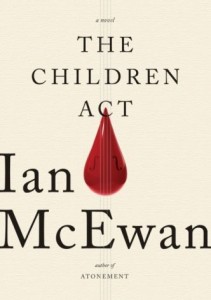 Ian McEwan has made a practice of immersing himself in the professions of which he writes. Medicine (Saturday), Music (Amsterdam), probably some others I don’t know about, and now the law. The Children Act introduces us to Fiona Maye, an eminent high court judge charged with the responsibility of negotiating the shoals of family law as expressed in what the British call the act which is also the book’s title.
Ian McEwan has made a practice of immersing himself in the professions of which he writes. Medicine (Saturday), Music (Amsterdam), probably some others I don’t know about, and now the law. The Children Act introduces us to Fiona Maye, an eminent high court judge charged with the responsibility of negotiating the shoals of family law as expressed in what the British call the act which is also the book’s title.
Fiona has been undergoing a period of depression and stress brought on by a recent decision concerning the separation of a pair of siamese twins. She played Solomon and sacrificed one so that the other could live. The depression has thrown her marriage into crisis, and she won’t talk about it to her husband or anyone else. As the marital rupture increases, we find ourselves involved in a number of her other cases, settling finally on the dilemma of allowing the death of a Seventh-Day-Adventist couple’s almost-adult son or ordering a blood transfusion.
Her decision in this one carries consequences far beyond the psychological ones, and it is this thread that constitutes the core of the book’s narrative.

As always, McEwan’s prose is wonderful, his story telling spiritual and human. We both revere and despise Fiona by turns. Just when we are about to give up on her, he brings us back to the heart that carried her into her profession in the first place. In that sense, this is an extremely rewarding read. The fault is in the husband. So focused are we on Fiona that Jack is never realized. I suspect that McEwan intends that to be so, since this is so powerfully Fiona’s book. However, I think it’s a fault. He’s too much foil, too little human for my taste.
Still and all, this is Ian McEwan, one of our greats, and one to be loved, if not, at least for this one, revered.

